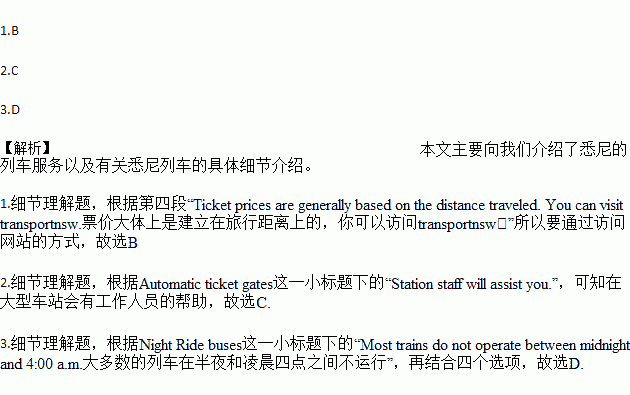题目内容
Sydney Trains is one of the most economical, reliable and convenient ways to travel throughout Sydney and its surrounds.
Our network, the NSW Trains Intercity, covers suburban Sydney and extends to the Hunter, Central Coast, Blue Mountains, Southern Highlands and South Coast regions.
The network is made up of several colour-coded lines. Trains from different lines can share the same platform, so check display screen and listen to announcements.
Ticket prices are generally based on the distance traveled. You can visit transportnsw. Info for details.
Getting to the City.
In Sydney, if you’re near a train station, you’re on your way to the city. Every rail line leads directly or indirectly to the City Circle. It’s the loop around the central business district of Sydney. Most City stations are underground so look out for the sign on street level.
Automatic ticket gates
Large stations have automatic gates for entry to, and exit from, the station. If you have an Opal card or a ticket which has a magnetic stripe you must use the automatic gates. You may use the wide gate for wheelchair, pram or luggage access. Station staff will assist you.
Night Ride buses
Most trains do not operate between midnight and 4:00 a.m. For your convenience a special Night Ride bus service is available between these hours on most Sydney suburban lines.
Track work
In order for the tracks to the maintained, we sometimes have to replace train with buses, particularly at weekends, Please check the track work section for the latest service alterations on your line.
1.To get more information about ticket pries, travellers had better________.
A. go to the City Circle B. visit a website
C. check display screen D. listen to announcements
2.What service is offered to travelers in need at most big stations?
A. A free Opal card. B. Earlier entry to the station.
C. Help from station workers. D. A ticket with a magnetic stripe.
3.Which is the best convenient time to travel by Sydney Trains?
A. At midnight. B. On Sunday afternoon.
C. Between midnight and 4:00 a.m. D. At 6:00 p.m. on Wednesday.
 天天向上一本好卷系列答案
天天向上一本好卷系列答案 小学生10分钟应用题系列答案
小学生10分钟应用题系列答案

 the top of the mountain.
the top of the mountain.